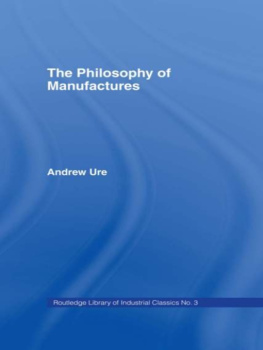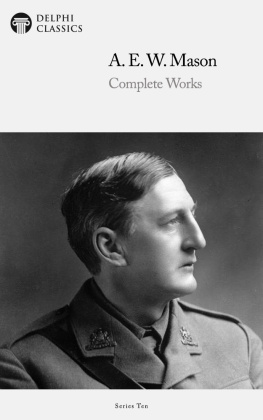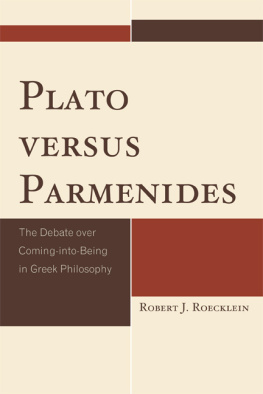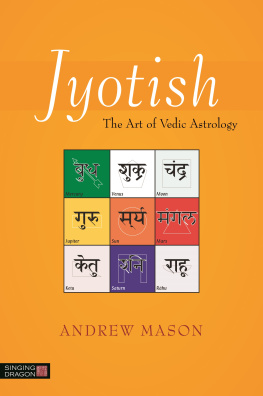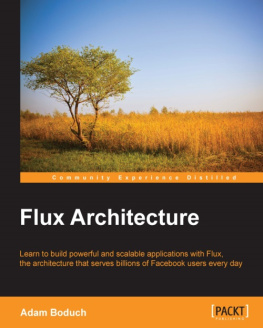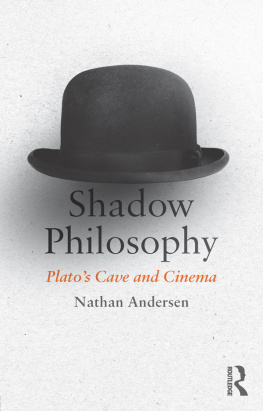FLOW AND FLUX IN PLATOS PHILOSOPHY
In this bold new study, Andrew J. Mason seeks both to shed light on the key issue of flux in Platos work, and to show that there is also in Plato a notion of flow that needs to be distinguished from flux. Mason brings out the importance of this hitherto neglected distinction, and proposes on its basis a new way of understanding the development of Platos thought.
The opposition between the being of Forms and the becoming or flux of sensibles has been fundamental to the understanding of Plato from Aristotle to the present day. One key concern of this book is to clarify which kinds or levels of flux Plato accepts in sensibles. In addition, Mason argues that this traditional approach is unsatisfactory, as it leaves out the important notion of flow. Unlike flux, flow is a kind of motion that does not entail intrinsic change. It is also not restricted to the sensible, but covers motions of soul as well, including the circular motion of nous (intelligence) that is crucial in Platos later thought, particularly his cosmology. In short, flow is not incompatible with being, and in this study Platos development is presented, largely, as his arrival at this view, in correction of his earlier conflation of flux and flow in establishing the claim that being is set apart from all motion.
Masons study offers fresh insights into many dialogues and difficult passages in Platos oeuvre, and situates Platos conception and usage of flow and flux in relation to earlier usage in the Greek poetic tradition and the Pre-Socratic thinkers, particularly Heraclitus. The first study of its kind, Flow and Flux in Platos Philosophy uncovers dimensions of Platos thinking that may reshape the way his philosophy is understood.
Andrew J. Mason holds a PhD in Philosophy from Macquarie University, Australia. He was previously a lecturer at Griffith University and Macquarie University.
ISSUES IN ANCIENT PHILOSOPHY
Series editor: George Boys-Stones, Durham University, UK
Routledges Issues in Ancient Philosophy exists to bring fresh light to the central themes of ancient philosophy through original studies which focus especially on texts and authors which lie outside the central canon. Contributions to the series are characterised by rigorous scholarship presented in an accessible manner; they are designed to be essential and invigorating reading for all advanced students in the field of ancient philosophy.
Flow and Flux in Platos Philosophy
Andrew J. Mason
Forthcoming titles:
Forms, Souls and Embryos: Neoplatonists on Human Reproduction
James Wilberding
Philosophy beyond SocratesAthens
Ugo Zilioli
The Hieroglyphics of Horapollo Nilous
Mark Wildish
Body and Mind in Ancient Thought
Peter N. Singer
FLOW AND FLUX IN PLATOS PHILOSOPHY
Andrew J. Mason
First published 2016
by Routledge
2 Park Square, Milton Park, Abingdon, Oxon OX14 4RN
and by Routledge
711 Third Avenue, New York, NY 10017
Routledge is an imprint of the Taylor & Francis Group, an informa business
2016 Andrew J. Mason
The right of Andrew J. Mason to be identified as author of this work has been asserted by him in accordance with sections 77 and 78 of the Copyright, Designs and Patents Act 1988.
All rights reserved. No part of this book may be reprinted or reproduced or utilised in any form or by any electronic, mechanical, or other means, now known or hereafter invented, including photocopying and recording, or in any information storage or retrieval system, without permission in writing from the publishers.
Trademark notice: Product or corporate names may be trademarks or registered trademarks, and are used only for identification and explanation without intent to infringe.
British Library Cataloguing in Publication Data
A catalogue record for this book is available from the British Library
Library of Congress Cataloging in Publication Data
Mason, Andrew J.
Flow and flux in Plato's philosophy / Andrew J. Mason. First [edition]. pages cm. (Issues in ancient philosophy)
Includes bibliographical references and index.
1. Plato. I. Title.
B395.M2877 2016
184--dc23
2015026418
ISBN: 978-1-138-91818-4 (hbk)
ISBN: 978-1-315-68868-8 (ebk)
For Mari
This book undertakes an unusual in some ways unheard of journey through Platos thought over the middle and late periods. In terms of content its novelty consists, broadly, in two theses. First, there is in Plato a notion of flow that is to be distinguished sharply from flux. The latter theme is familiar to all readers of Plato, but commentators (abetted by Platos own failure to distinguish the two explicitly) have not seen the distinction with flow or grasped its importance. Second, this notion of flow casts a new light on the course of Platos thought from the first middle dialogue (the Cratylus) all the way through to his last dialogue, the Laws. It is not quite a case of T.S. Eliots in my end is my beginning, for there is more to flow in Platos beginning than he avers expressly at the end (and indeed more to flux in Plato's subsequent thought than he is able yet to see in the Cratylus), but there is a resemblance, and I think a very significant one.
Inasmuch as it treats these two dialogues as a frame for addressing those in between, the present study is also unusual in the way it approaches Platos corpus. Regarding the Cratylus, the overwhelming tendency has been to disregard the etymological section as both unserious in itself and of no serious value in assaying Platos own thought, be it about the correctness of names (the dialogues stated theme) or anything else. Ackrill (1997: 33) speaks for many in finding philosophical relevance in the Cratylus only in the passages before and after it. Slowly this has been changing. For Baxter (1992: 2), we cannot do the Cratylus justice without doing the etymologies justice. Barney (2001), Sedley (2003), and Ademollo (2011) all argue in their own ways for the seriousness of the etymologies. Nevertheless, these studies are still held back by the assumption that flow = flux. In the etymologies, a notion of flow is in play that is fundamentally at odds with the doctrine of flux which the namegivers are said to have presupposed. Unlike flux, this flow is not incompatible with being. In fact, here the Cratylus anticipates Platos much later redefinition of being in the Sophist to accommodate entities besides motionless Forms. In this book I treat the etymological inquiry as a reservoir which Plato (although he ultimately turns his back on it in the Cratylus itself) goes back to and draws from for the rest of his career, precisely in relation to themes to which he cannot do justice simply by relying on the opposition between unchanging Forms and sensibles in flux.
Regarding the late dialogues, while I certainly do not subscribe to the view that they abandon the theory of Forms, nor do I think they are only distinguished by being late. Partly this is because I am (largely) persuaded by Sayres (1983) claim that late Plato modifies the theory. But the more important point, in this book, is Platos emphatic turn to cosmology in the late period, beginning with the Timaeus. It is astonishing to read that in the mid-1980s scholarship on this key Platonic text had become almost a wasteland (Mohr 2005: xi). Platos cosmotheology has certainly become a much livelier field of study in the decades since. This burgeoning interest has restored the



